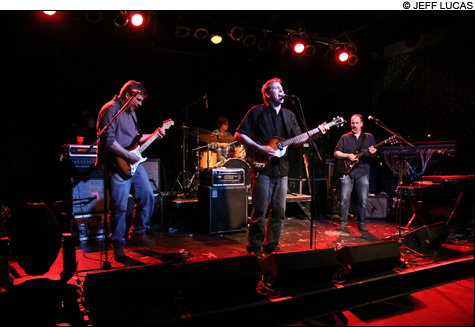
HALF AND HALF Coming Grass + Strangefolk = Dirigo. |
For some of us, the title of Dirigo's debut album makes perfect sense. But I can't tell you how many times I've been asked: "So, it's like Jamaican reggae, but played in America?"
No. Jamericana is a nearly equal mix of "jam," which implies extended explorations of certain melodic riffs, almost the way jazz players throw ideas around, and "Americana," which is the way people who don't like "country" refer to country music. You know, since half of Dirigo is from well-known Vermont-based jam band Strangefolk and the other half is from Maine alt-country stalwarts like the Coming Grass and Darien Brahms's band.
It's like Dirigo adhered to some kind of honesty-in-labeling law. The record was exactly what I thought it was going to be. Though not everyone will bring as much fore-knowledge of the disc as I do. I was lucky enough to witness the early days of Strangefolk, at Isham Street keg parties in Burlington, before Luke Patchen Montgomery and Erik Glockler were household names in the jam scene. And not too many weeks go by where I don't pop in the first Coming Grass record, where Steve Jones plays effortless-seeming country riffs and Ginger Cote is bedrock on the drums.
Maybe I thought Jones and Cote would seem more like hired guns, since Montgomery and Glockler were part of the more established band. But right from the outset of the opening "Wrong Way," the guitar tone and vibe are so Steve Jones that the song could have come off one of his solo albums. The folk-rock is comfortable and warm, and the sentiment has his weather-beaten ken: "I can't keep up with you/This old body's worn and shaken."
"Before the Moment's Gone" is more recognizably jammy, with a funky and halting staccato stutter-step. Montgomery and Jones layer their guitar leads on top of each other, stepping on each other's tail just enough to get the heart rate up. Both are subtle players who know when to play two notes instead of four, and throughout the record we're treated to solos that manage to be exciting without beating us about the head and neck.
Dirigo do well to mix up the sounds here, too. "Don't Play Me" has a little bit of a "Lime in the Coconut" approach, Glockler driving the melody with his bass. "Like You Said" has a Steely Dan feel to it, with Montgomery reaching higher for a tenor part and Cote providing a light touch on the cymbals, rattling around the tambourine from time to time. In both songs, we hear a tone of remorse, regret, nostalgia, tinged with falsetto: "There's a whole lot of things we can never take back/That we said, that we said, that we said."
Mimicking a tendency of the Steve Jones solo records, these songs, though they ought by most rights to be down-in-the-mouth, always manage to have a sunniness to them that's infectious. Like a wry smile during a sad story. It's something you feel as much as hear.
"For Jenny (Honey)" is one of the few tunes that's actually just happy-go-lucky from the outset. Like something the Band or Buffalo Springfield would have put together, it's full of resonator guitar and hammer-on acoustic, with lick breakdowns that are old-time country. For once among the 11 songs here, it's tough to imagine the 15-minute version, since it's so acoustic and crisp.